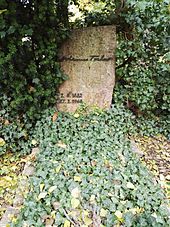Johannes Tralow
Johannes Tralow (born August 2, 1882 in Lübeck , † February 27, 1968 in East Berlin ; pseudonym Hanns Low) was a German novelist, storyteller , playwright and publicist . He was married to the 23 years younger author Irmgard Keun (1932–1937).
Life
After completing a commercial apprenticeship, he worked for several years as a volunteer in the Middle East (including in Egypt in 1899/1904 ). From 1908 to 1910 he was editor-in-chief of the short-lived Lübecker Stadt- und Landbote . From 1914 he started working for eighteen years at the theater. On October 17, 1932, he married the writer Irmgard Keun in Cochem ; In 1937 the marriage was divorced again. After the takeover of the Nazis in 1933, he lived in retirement as a freelance writer . After his election as President of the then PEN Center East and West (1951 to 1960), his works were mainly relocated to the GDR , to which he moved in the last years of his life.
Tralow, based on extensive historical studies, “opened the door to almost unknown historical worlds for his readers and brought them closer to the cultural and moral history of entire peoples in exciting acts” ( B. Brandl ).
Tralow's most important narrative is the Ottoman tetralogy with the novels
- Roxelane (1942, Zurich 1944, as "undesirable" in Germany),
- Irene of Trebizond (1947),
- Malchatun (1952) and
- The Eunuch (1956).
In this cycle Tralow depicts the rise of the Ottomans from the Turkish nomadic tribe to world power as well as the beginning disintegration (13th to 18th centuries). The colorful portrayal of bloody power struggles lives mainly through the fascinating female figures.
Tralow's last book, on which he worked for several decades, was the biographical novel
- Mohammed (1967)
With him he wanted to make a contribution to "deepening friendship with the Arab peoples and understanding their cultural history".
He is buried in the cemetery of the Dorotheenstadt and Friedrichswerder communities in Berlin-Mitte.
Awards
- Titular Professor, awarded by the Ministry of Culture (GDR)
- German Peace Medal of the Peace Council of the GDR (1967)
Works
- The Banquet at Pavia (1905, first performance 1908, drama)
- Cain - the Savior (1911, novel)
- Peter Fehrs' models (1912, drama)
- Inge. The Drama of a Love (1912, drama)
- The Mother (1914, drama)
- A Man His Age (1914, drama)
- The Oresteia of Aeschylus (1920, adaption)
- Medea des Euripides (1924, adaption)
- König Neuhoff (1929, novel about Theodor von Neuhoff )
- Violence from the Earth (1933, novel; 1947 under the title "Cromwell")
- The Moselle in love (1936, short stories)
- Where is Petermann? (1936, novel)
- Trebonius inherits a woman (1937, novel)
- Flibustier before Veracruz (1937, novel, 1943 under the title privateers and women , 1948 under the title Wind um Tortuga )
- A Doubtful Man (1938, detective novel, 1949 under the title Wind from Alaska )
- Black Orchids (1939, adventure novel, 1949 entitled The City in the Jungle )
- The Swapped Sisters (1939, novel)
- The Two Elikotts (1941, novel)
- Friederike and the Friends (1946, short stories)
- Rosska. Fondi (1949, two stories, excerpts from Roxelane )
- Uprising of the Men (1953, novel)
- Boycott (1950, novel also called The Girl from the Emerald Isle )
- Words against weapons. Writers urge peace (1951)
- The Beginning (1958, autobiography)
- Kepler and the Kaiser (1961, novel)
literature
- Maren Horn: Tralow, Johannes . In: Who was who in the GDR? 5th edition. Volume 2. Ch. Links, Berlin 2010, ISBN 978-3-86153-561-4 .
- Obituary in Der Spiegel , 10/1968 .
- Ghazel Sharif: The figure of Muhammad in Klabund, Friedrich Wolf and Johannes Tralow , Leipzig, Univ., Diss., 1970.
- Helga Stötzer, Christa Unger, Willy Unger: Johannes Tralow - Life and Work , Berlin 1968.
- Helga Stötzer, Helga Döhn: The Johannes Tralow estate, Berlin 1977.
Web links
- Literature by and about Johannes Tralow in the catalog of the German National Library
- Website of the Lübeck high school Katharineum about Johannes Tralow
| personal data | |
|---|---|
| SURNAME | Tralow, Johannes |
| ALTERNATIVE NAMES | Low, Hanns (pseudonym) |
| BRIEF DESCRIPTION | German novelist, storyteller, playwright and publicist |
| DATE OF BIRTH | August 2, 1882 |
| PLACE OF BIRTH | Lübeck |
| DATE OF DEATH | February 27, 1968 |
| Place of death | East Berlin |
